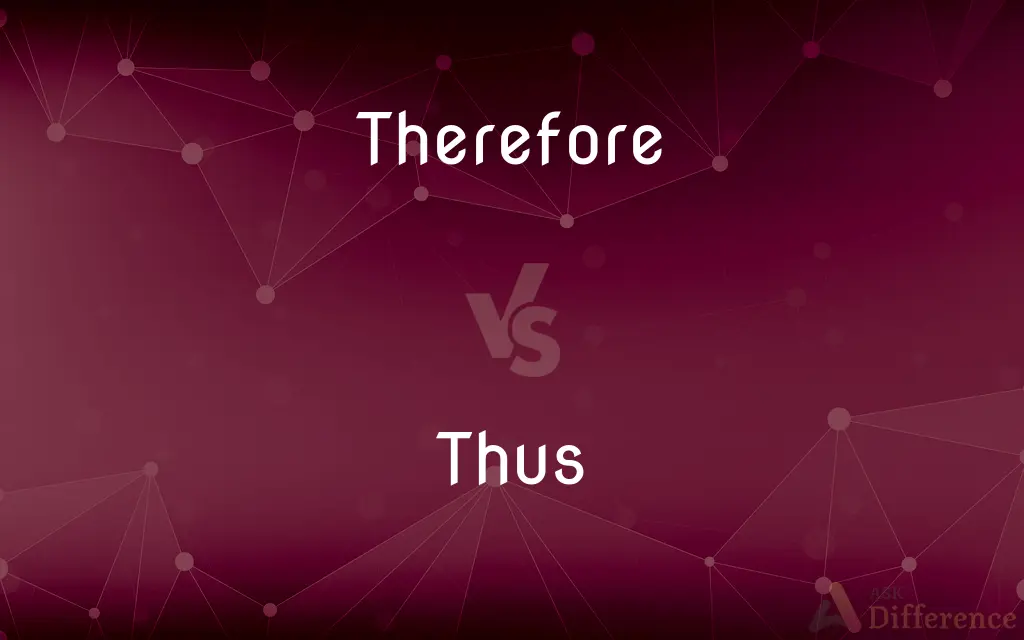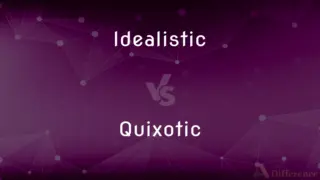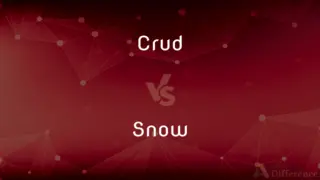Therefore vs. Thus — What's the Difference?
Edited by Tayyaba Rehman — By Fiza Rafique — Updated on September 25, 2023
Therefore is used to indicate a conclusion or logical consequence. Thus is employed to show a result or way something is done.

Difference Between Therefore and Thus
Table of Contents
ADVERTISEMENT
Key Differences
Therefore connects ideas to show cause and effect or inference. Thus often introduces a specific example or clarifies a point.
Therefore is slightly more formal and commonly used in academic or technical writing. Thus is versatile and can be used in various contexts, including everyday language.
Therefore usually appears in the middle or at the beginning of a sentence. Thus can be used at the beginning, middle, or end of a sentence.
Comparison Chart
Meaning
Indicates a conclusion or consequence
Denotes a result or method
Usage
Connects ideas, cause-effect
Introduces examples, clarifies
ADVERTISEMENT
Formality
Slightly more formal
Versatile, used in many contexts
Position
Typically middle or beginning
Can be used at various sentence positions
Alternatives
"Hence," "consequently"
"Therefore," "so," "as a result"
Compare with Definitions
Therefore
A word signaling cause-and-effect relationships.
He missed the train; therefore, he arrived late.
Thus
A word denoting a way something is done or an outcome.
He trained hard; thus, he improved his athletic performance.
Therefore
Used to indicate a logical consequence or conclusion.
The weather forecast predicted rain; therefore, I brought an umbrella.
Thus
Used to introduce a result or clarify a point.
The recipe called for specific ingredients; thus, we followed it precisely.
Therefore
A transitional word showing a conclusion.
She studied diligently; therefore, she aced the exam.
Thus
Indicates a logical consequence or conclusion.
The company invested in research; thus, they gained a competitive edge.
Therefore
Indicates a result or inference based on preceding information.
The experiment yielded significant results; therefore, the hypothesis was supported.
Thus
Demonstrates the result of an action or event.
The negotiations were successful; thus, the partnership was formed.
Therefore
Demonstrates the outcome of a given situation.
The traffic was heavy; therefore, we reached the destination later than planned.
Thus
A versatile term used to connect ideas or explain a process.
She saved consistently; thus, she built a substantial nest egg for retirement.
Therefore
For that reason or cause; consequently or hence.
Thus
In this manner
Lay the pieces out thus. See Usage Note at thusly.
Therefore
(conjunctive) Consequently, by or in consequence of that or this cause; referring to something previously stated.
Traditional values will always have a place. Therefore, they will never lose relevance.
Thus
To a stated degree or extent; so.
Therefore
For that; for it (in reference to a previous statement)
Thus
Therefore; consequently
Thus it was necessary for me to resign.
Therefore
For that or this reason, referring to something previously stated; for that.
I have married a wife, and therefore I can not come.
Behold, we have forsaken all, and followed thee; what shall we have therefore?
Thus
For example
Few of the nation's largest cities are state capitals.
Thus neither New York nor Chicago is the seat of its state's government.
Therefore
Consequently; by consequence.
He blushes; therefore he is guilty.
Thus
(manner) In this way or manner.
If you throw the ball thus, as I’m showing you, you’ll have better luck hitting the target.
Therefore
(used to introduce a logical conclusion) from that fact or reason or as a result;
Therefore X must be true
The eggs were fresh and hence satisfactory
We were young and thence optimistic
It is late and thus we must go
The witness is biased and so cannot be trusted
Thus
(conjunctive) As a result.
I have all the tools I need; thus, I will be able to fix the car without having to call a mechanic.
Therefore
As a consequence;
He had good reason to be grateful for the opportunities which they had made available to him and which consequently led to the good position he now held
Thus
The commoner kind of frankincense, or that obtained from the Norway spruce, the long-leaved pine, and other conifers.
Thus
In this or that manner; on this wise.
Thus did Noah; according to all that God commanded him, so did he.
Thus God the heaven created, thus the earth.
Thus
To this degree or extent; so far; so; as, thus wise; thus peaceble; thus bold.
Thus far extend, thus far thy bounds.
Thus
An aromatic gum resin obtained from various Arabian or East African trees; formerly valued for worship and for embalming and fumigation
Thus
(used to introduce a logical conclusion) from that fact or reason or as a result;
Therefore X must be true
The eggs were fresh and hence satisfactory
We were young and thence optimistic
It is late and thus we must go
The witness is biased and so cannot be trusted
Thus
In the way indicated;
Hold the brush so
Set up the pieces thus
Common Curiosities
What is the purpose of using transitional words like "therefore" and "thus" in writing?
These words help convey relationships between ideas, making the text more coherent and guiding readers through the logical flow of information.
What is the key function of the word "therefore" in a sentence?
"Therefore" is used to indicate a conclusion or logical consequence based on preceding information.
Is "thus" appropriate for everyday conversation, or is it more suitable for formal writing?
"Thus" is versatile and can be used in both everyday conversation and formal writing, making it a flexible choice for various contexts.
Can "therefore" and "thus" be used interchangeably in all contexts?
While they overlap in some cases, "therefore" is generally more formal and emphasizes cause and effect, whereas "thus" is versatile and can be used in various contexts.
When is "thus" commonly employed in writing or speech?
"Thus" is often used to introduce a specific example or clarify a point, indicating a result or way something is done.
What is the significance of using "thus" to introduce examples in writing?
"Thus" helps clarify and emphasize specific examples or outcomes, making the text more informative and persuasive.
Can "therefore" be replaced with other words or phrases?
Yes, "therefore" can be substituted with synonyms like "hence" or "consequently" to convey a similar meaning.
In which type of writing, formal or informal, is "therefore" more commonly used?
"Therefore" is slightly more formal and is frequently used in academic, technical, or professional writing.
How does "therefore" affect the structure of a sentence?
"Therefore" often appears in the middle or at the beginning of a sentence to establish a logical link between ideas.
What is the primary purpose of using "thus" at the beginning of a sentence?
When used at the beginning, "thus" sets up the context for the information that follows, emphasizing a result or method.
How can writers decide between "therefore" and "thus" when transitioning between ideas in a paper?
The choice depends on the emphasis the writer wants to convey; "therefore" emphasizes cause and effect, while "thus" highlights results or methods.
Are "therefore" and "thus" used differently in mathematical or scientific writing?
Both words are commonly used in mathematical and scientific contexts to indicate conclusions or results.
Can "thus" be employed to introduce a series of examples within a paragraph?
Yes, "thus" can be used to introduce a series of examples, providing clarity and coherence in the text.
Is "thus" suitable for creating a smooth transition between paragraphs in an essay?
Yes, "thus" can be used to transition between paragraphs, especially when connecting ideas or introducing a new line of reasoning.
Can "therefore" and "thus" be used within the same sentence for added emphasis?
Yes, they can be used together to reinforce a logical connection or to emphasize the conclusion and the result simultaneously.
Share Your Discovery

Previous Comparison
Idealistic vs. Quixotic
Next Comparison
Crud vs. SnowAuthor Spotlight
Written by
Fiza RafiqueFiza Rafique is a skilled content writer at AskDifference.com, where she meticulously refines and enhances written pieces. Drawing from her vast editorial expertise, Fiza ensures clarity, accuracy, and precision in every article. Passionate about language, she continually seeks to elevate the quality of content for readers worldwide.
Edited by
Tayyaba RehmanTayyaba Rehman is a distinguished writer, currently serving as a primary contributor to askdifference.com. As a researcher in semantics and etymology, Tayyaba's passion for the complexity of languages and their distinctions has found a perfect home on the platform. Tayyaba delves into the intricacies of language, distinguishing between commonly confused words and phrases, thereby providing clarity for readers worldwide.















































